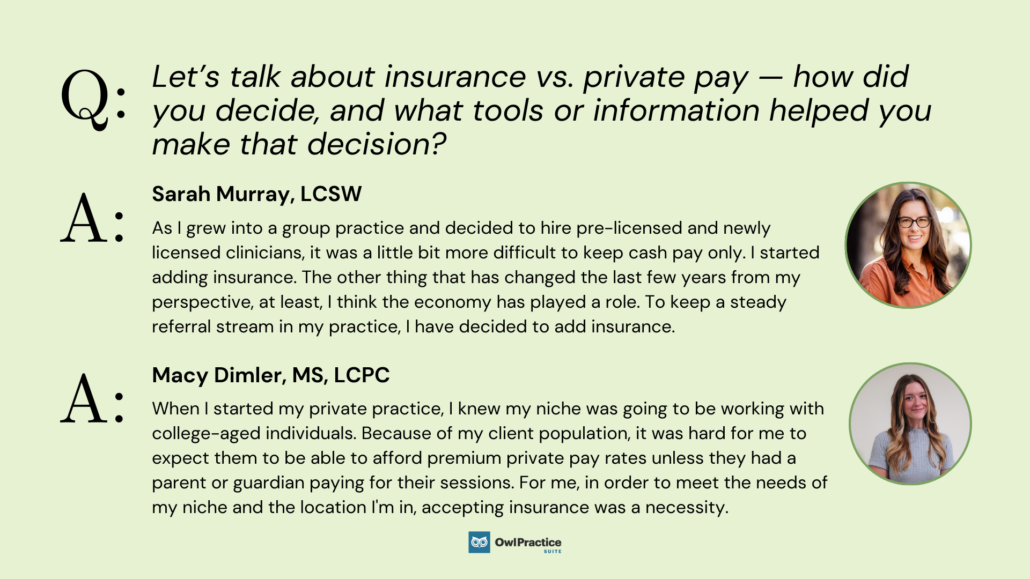
Let’s talk about insurance vs. private pay — how did you decide, and what tools or information helped you make that decision?
Sarah: In regards to this question, I know plenty of practices that have gone, started cash pay, gotten to insurance, gotten back to cash pay. I started as cash pay only, again, similar to Candice, very part-time, and have moved to now taking insurance and continue to take cash pay as well. Yes, private practice can be one client and two chairs, and I guess it’s funny now you don’t need the chairs. A computer is great. Yes, I started again with just cash pay and a couple of clients in the evening, and I was able to maintain that for a while.
As I grew into a group practice and decided to hire pre-licensed and newly licensed clinicians, it was a little bit more difficult to keep cash pay only. I started adding insurance. The other thing that has changed the last few years from my perspective, at least, I think the economy has played a role. There was a lot of demand, certainly a lot of need, and the economy was different like when the pandemic first hit. Then, things have dropped off since then. To keep a steady referral stream in my practice, I have decided to add insurance.
A few other things to consider is how many clients do you want to work with each week? How much money do you want to make or need to make? I’m a big proponent that everybody, in private practice and all therapists, should be able to pay their bills. Definitely worth considering that. How many hours you’re planning to see clients each week? How many hours you’re available to work? How important is it for you to accept insurance? How quickly do you need clients in the door? How steady do you need that stream to be? What population do you plan to work with? Just a few things to consider.
Megan: Sarah, not to put you on the spot, but with insurance, I know a big question comes up around access and equity and stuff like that. How have you navigated that at different points when it comes to insurance?
Sarah: Yes, I’ve always offered a sliding scale. The way I’ve done that is really setting my lowest number I’m willing to go to, up to the highest. I feel like clients are pretty honest about how much they feel like they can afford. I’ve always tried to make myself accessible in that way. Of course, with insurance, there’s even more accessibility, and I even accept Medicaid now as well.

Macy: I think some of my key points are going to be really similar to Sarah. When I started my private practice, I knew my niche was going to be working with college-aged individuals. Because of my client population, it was hard for me to expect them to be able to afford premium private pay rates unless they had a parent or guardian paying for their sessions. For me, in order to meet the needs of my niche and the location I’m in, accepting insurance was a necessity.
I also found that starting a private practice is a significant learning curve, and getting on insurance panels was something I didn’t really want on my plate right away. I found a company to get me credentialed and do all my billing for me. The key considerations I had to make in making this decision were, first, my niche and client population and how to serve them best, second, the financial need to keep my business running and also pay myself fairly, and third, how many clients I needed to see in order to meet those needs.
The last consideration was deciding who would handle the credentialing and billing for me. Since that wasn’t something I was open to doing myself, I had to find a solution. For people who are open to it, you’d also need to consider whether you want to learn how to do it yourself.
Read more about the panelists and where to follow them here: Power to the Private Practice: Finding Your Best Path to Private Practice.
Read Part 3 and more below:
- Part 1: What are three things you wish you could tell yourself in the year before you started your private practice?
- Part 3: How did you decide between using platforms like Alma and Headway vs. going completely independent? What are the trade-offs?
- Part 4: How do you…pay taxes? Do market research? Brand yourself? Stay on top of bookkeeping?
- Part 5: How do you continue to stay informed and have a support network to help answer questions and navigate private practice after you are up and running?
- Part 6: Webinar Attendee Submitted Questions, and General Q&A

Start a Free Trial!
Reduce clinical administrative tasks and transform more lives with Owl Practice. Owl Practice provides all the tools you need to make your practice successful. Join the thousands of care professionals using Owl to run their practice every day.



